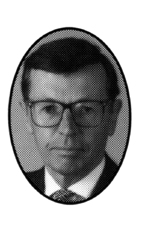moved for leave to introduce Bill C-57, an act to implement the agreement establishing the World Trade Organization.
(Motions deemed adopted, bill read the first time and printed.)
 House of Commons photo
House of Commons photoWon his last election, in 1993, with 61% of the vote.
World Trade Organization Agreement Implementation Act October 25th, 1994
moved for leave to introduce Bill C-57, an act to implement the agreement establishing the World Trade Organization.
(Motions deemed adopted, bill read the first time and printed.)
Lumber Industry September 29th, 1994
Mr. Speaker, I fully share the member's eagerness to see this situation resolved. We have pursued our discussions with the United States administration at the highest level. We have received assurances that the amounts will be fully refunded.
Lumber Industry September 29th, 1994
Mr. Speaker, the United States is reimbursing the amounts collected after March of this year. With regard to the amounts collected prior to March, the process is under way for the full reimbursement of the outstanding amount plus interest.
Trade June 22nd, 1994
The fact is, Mr. Speaker, that the government acted and acted vigorously to bring to a successful conclusion the Uruguay round of the GATT. That success will go some way to resolving some of the dispute procedures which the United States has chosen to follow in its ill-advised and unwarranted activities.
In addition, during the adoption of NAFTA by this government we put in place a requirement that Canada, the United States and Mexico would discuss among themselves practices pertaining principally to anti-dumping, the major tool which the United States uses in its continuing harassment of Canadian exports to the United States, so as to resolve just this sort of issue.
Trade June 22nd, 1994
Mr. Speaker, the reason is quite simple. The United States' demands are unreasonable.
Trade June 20th, 1994
Mr. Speaker, I thank the hon. member for his question. It reflects his ongoing concern about environmental issues in our country, particularly the question of how best to dispose of unrecyclable materials, those materials which do not lend themselves readily to recycling.
I want to salute the member for drawing to our attention this question which has been of concern to the government as it addresses in the environmental arena such concerns as he has raised today. I only add that it is not a matter primarily of trade policy but rather a matter of environmental policy as we address these questions.
Lumber June 15th, 1994
Quite frankly, Mr. Speaker, I have no idea why the United States representative would have said such a thing. Perhaps she offered it as a comment in the heat of the legal discussion, but it certainly has no substance in practice. We would not accept any such practice as described by the hon. member.
Lumber June 15th, 1994
Mr. Speaker, we reject the statements that were made with regard to possible FBI investigations of panellists under the NAFTA and the FTA. I would only add that it is a matter that the Solicitor General would be able to address if the member wishes to delve further into it.
Certainly under the FTA and NAFTA there is no provision whatever for the type of activity that the hon. member has cited and we reject any such practice.
Lumber June 13th, 1994
Mr. Speaker, no.
Lumber June 13th, 1994
Mr. Speaker, as a general comment, the hon. member will know that the matters discussed in the newspaper article to which he refers occurred at a period when this government was not in office. It is difficult for me to comment on the motives and the reasons of the government that was in office at that time.
On the specific issue of softwood lumber, the Government of Canada did support the assertion that Quebec lumber exporters should have a separate rate. Unfortunately, the free trade panel which ruled that Canadian practices do not constitute a countervailable subsidy upheld the decision of the U.S. Commerce Department not to exempt Quebec from the national duty deposit rate.